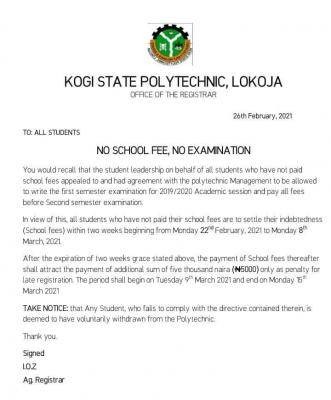
The National Association of Nigerian Students (NANS) has set up an 18-man committee to monitor the disbursement of the 200 billion Naira (about 1.3 billion dollars) released by the Federal Government for the revitalisation of Federal Universities to ensure accountability of the fund.
The president of the association, Comrade Yinka Gbadebo, told reporters in Abuja on Sunday that the move was to ensure transparency and appropriate evaluation of the entire projects and programs which the funds had been dedicated to as enshrined in the signed Memorandum of Understanding (MoU).
“Keeping a diligent watch on the process and evaluating the extent of implementation will be beneficial to all students to avoid further rifts between the two parties in the future and to equally keep the lecturers on their toes,” Gbadebo said.
Dwindling Education Standard
The Federal government released the revitalisation funds last week, after five months of inactivity in the universities due to the Academic Staff Union of Universities’ strike.
Both the government and the university lecturers’ union signed an MoU that would ensure that both parties are committed to bringing the needed revitalisation of Nigerian universities to reality.
The standard of education in Nigerian universities has continued to dwindle due to neglect of the sector.
Efforts to resolve the issues in Nigeria’s education sector began in December 14, 2006, when the then Minister of Education, Dr. Obiageli Ezekwesili, inaugurated on behalf of the Federal Government, a negotiating committee headed by Mr. Gamaliel Onosode, to find a permanent solution to the issues in the educational system.
Five major issues were slated for resolution and discussion – funding, ACAREF (Academic Reform), University autonomy, condition of service of lecturers and university staff generally.
It was agreed that the Federal Government, States, private sector, the Educational Task Fund, the Petroleum Development Task Fund and alumni associations be involved in funding of public universities to enable the institutions get the necessary infrastructures in order to meet international standards.
A plan to spend 1.5 trillion Naira with a three-year rolling module - 2009-2011- was agreed on.
It was also agreed that 26 per cent of the annual budget should be spent on education.
On the issue of condition of service, the lecturers’ retirement age was also looked into and the retirement age was extended to 70 years.
Since then, the only aspect of the agreement that has been fully implemented is the increasing the retirement age of lecturers, a development that has led to continuous dwindling of education standard in Nigeria.
During the proposal of Nigeria’s 2013 budget, it was discovered that only 8.67 per cent of the proposed total budget of 4.92 trillion Naira (about 31.5 billion dollars) was allocated to education, an amount that falls far below the UNESCO recommended allocation of 26 per cent.


